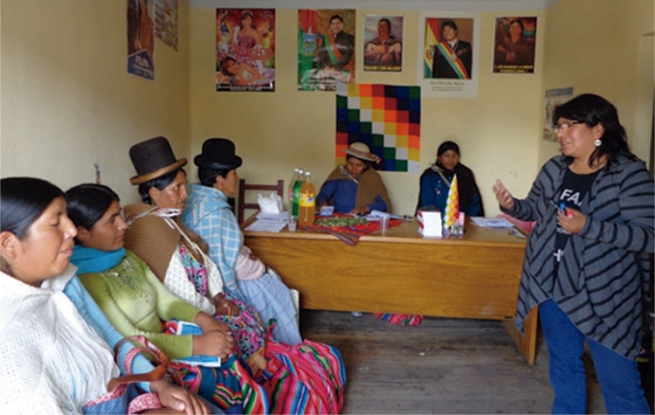BOLIVIA: Women Empowerment Project Aims to Reduce Physical Violence in Families

(MissionNewswire) Salesian missionaries with Solidaridad Don Bosco have been collaborating and coordinating a project with the Machaqua Amawta Foundation, with the support of Extremadura for International Development Cooperation (AEXCID), to facilitate a project that aims to reduce violence against women in the rural municipalities of Chuma, Ayata and Aucapata, in the Muñecas province within the Department of La Paz, Bolivia.
Women living in the Andes live in a predominantly patriarchal society where men have ultimate authority and exercise their power over women, which often leads to unequal and abusive relationships. Bolivia is high on the list of 13 countries in Latin America with regard to cases of physical violence against women and is second on the list in terms of sexual violence. One woman taking part in the project noted that she feels she is only there to serve men and that by speaking out she risks her life.
The Machaqua Amawta Foundation has identified the need to respond to the discrimination and violence that many of these women experience in their homes. The project has three main objectives. First, to promote more equitable gender relations in the educational community. Then, to try to strengthen the social organizations engaged in working toward the eradication of inter-family violence and political discrimination. And finally, to strengthen local legal services and aid them in developing concrete strategies to prevent and address violence against women, as well as provide adequate and effective assistance.
“A woman wants to participate in the meetings but jealousy and distrust of her husband makes it difficult. Many women say they have no choice but to endure the abuse and remain with their husband until he kills them,” says Veronica Ojeda, of the provincial government of Muñecas, in speaking about some of the women’s experience who participate in the project.
The women participating hope to be able to achieve a positive change in the attitude of men. This will strengthen the family harmony and lead to teaching their children the values of respect for women, tolerance and working together for generations to come.
“There are many disadvantages and barriers to achieving equality that women in these communities face including access to education and work that can help them achieve financial independence,” says Father Mark Hyde, executive director of Salesian Missions, the U.S. development arm of the Salesians of Don Bosco. “It is very important for women to have access to information about their legal rights and to be able attend school and gain an education. Women that are empowered through education are more often able to achieve financial independence and make better and healthier choices that affect not only themselves, but their families and communities as well.”
Bolivia is the poorest country in South America and has the most unequal income distribution on the continent. According to UNICEF, 60 percent of Bolivians live below the poverty line with 40 percent of those living in extreme poverty. The poverty rate is higher in rural areas where the rate increases to 75 percent of the population. It is common for Bolivians to struggle to find adequate nutrition, shelter and other basic necessities.
The geography of Bolivia contributes to the overwhelming poverty of its residents. Large swaths of the country remain undeveloped with a lack of roads and infrastructure in place, negatively impacting the indigenous farming populations who typically live there. Only half of rural children complete primary school and many others leave school to help support their families, according to UNICEF. There are others who are left homeless by parents who cannot afford to care for them and those who leave their homes to escape violence.
###
Sources:
ANS – Bolivia – Reduction in violence against women in rural areas
UNICEF – Bolivia




